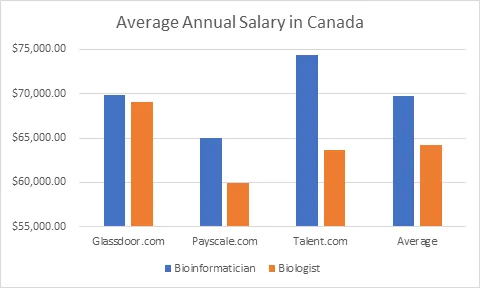Bioinformatics (GC)
Length of program
Program consists of:
Campus
Intake
Program description
You should have an academic background in one of the following, or in a field related to:
- Biological Sciences
- Biochemistry
- Neuroscience
- Genetics
- Microbiology
- Biotechnology
- Mathematics
- Computer sciences
- Engineering
Don't have prior computational experience? Expand your knowledge and skills in computer science and programming using Unix systems, algorithms, data structures, string manipulation, basic concepts of software development and programming languages.
Have a background in computer science? Learn basic concepts of biological and genetic information and master further data analysis skills in a focused topic area, such as bioinformatic algorithms, genomics and medical informatics. You'll also demonstrate competency with programming languages.
Career pathways
The application of genomics technologies, of which bioinformatics constitutes the core, helps to solve real-world problems in multiple sectors, including health services, agriculture, environment, forestry, and mining, providing new insights into management and sustainable resource strategies in these industries. Additionally, national labour market data shows many of the learning outcomes and objectives as highly desired skills (see detailed learning outcomes below).
Graduates of this certificate program will also develop general in-demand skills in research, communication, collaboration, problem solving, and organization.
In case of discrepancies between this page and the Graduate Studies Calendar and Course Catalogue, the Graduate Studies Calendar and Course Catalogue shall prevail.

~ Melissa Ota (BSc Co-op '21, GC '22)
Additional information
Applicants must normally meet the following minimum requirements:
- Hold a baccalaureate degree (i.e. undergraduate degree) from a recognized degree-granting institution
- Have a minimum grade point average of 3.00 (based on the uLethbridge 4.00 scale) on the last 20 graded university-level term courses (60.0 credit hours)
- Demonstrate English Language Proficiency (ELP) for graduate students
Applicants should have an academic background in Biological Sciences, Biochemistry, Neuroscience, Genetics, Microbiology, Biotechnology, Mathematics, or Computer Science, or related fields.
Students are required to complete:
- Biochemistry 5400/Neuroscience 5400 - Essentials of Bioinformatics
- Biochemistry 5410/Neuroscience 5410 - Practical Bioinformatics
- Biochemistry 5420/Neuroscience 5420 - Advanced Bioinformatics
Plus one of:
- Biochemistry 5990 - Independent Study
- Computer Science 5850 - Algorithms in Bioinformatics
- Neuroscience 5850 - Workshop in Computational Neuroscience
- An approved elective related to Bioinformatics
Course descriptions are available in the Course Catalogue.
On successful completion of this program, students should be able to:
- Understand both basic and advanced concepts of bioinformatics.
- Understand the wide range of possible bioinformatics applications in the health services sector and the agriculture industry and use bioinformatics tools in a Unix computer environment for analysis of high throughput sequencing and other omics data.
- Perform problem solving in academic and industrial environments on projects related with generation and analysis of omics data.
- Work effectively as a member of a bioinformatics team.
- Organize and pursue a scientific or industrial research project in fields such as biological databases; algorithms in bioinformatics; biocomputing; basic probability and statistics in bioinformatics; genome architecture and functional genomics; and omics applications in precision health and agriculture.
- Write scientific and industrial R&D reports to a professional standard, equivalent to that of a level one scientist.
- Derive and apply solutions from knowledge of sciences, technology, and mathematics.
Depending on prior training, students will also be able to:
- Life sciences background: Apply skills in computer science and programming for life scientists without prior computational experience through use of Unix systems, algorithms, data structures, string manipulation, basic concepts of software development and programming languages.
- Computer sciences/engineering background: Demonstrate knowledge in basic concepts of biological and genetic information and master further data analysis skills in a focused topic area, such as bioinformatic algorithms, genomics and medical informatics. Demonstrate competency with programming languages such as Perl and R.
The genetic information of all organisms (humans, animals, plants, microorganisms) is encoded mainly in the biochemical sequence of the four DNA bases (A, T, C, G). It forms their genome, which in the case of humans is 3-billion-DNA-base-long. To store the extraordinary amount of genomic information in non-digital media, we would need more than 1200 hefty telephone books (1000 pages each). Until recently, more than a day would have been required to "read" just a single page of these books with devices called sequencers, which were the size of a large refrigerator. However, today, a new generation of sequencers (often of the size of a cell phone) can read all these pages in a matter of hours. For the first time, we can resolve fundamental questions about life and use this information for applications in almost all areas of modern life and economy. Bioinformatics is the scientific field that handles this incredible amount of data produced through these new disruptive technologies.
Bioinformatics applications include but are not limited to fields such as:
Health Care | personalized genomics, precision medicine, molecular diagnostics, genetic testing and screening, genomic epidemiology, antimicrobial resistance surveyance and monitoring
Wellness | population genetics, ancestry services, wellness genomics, nutrigenomics
Agriculture | smart agriculture, antibiotic resistance and one health, crop health and sustainability, livestock sustainability, enhancement and health
Biotech Research and Development | novel drug development, testing and diagnostic monitoring services
Environment and Sustainability | wastewater and water system monitoring, toxicology, impact and sustainability tracking and tracing
Experience and comfort in bioinformatic analysis are an asset and valuable skillset in all biological sciences and a distinguishing factor by many employers seeking new hires in these fields.
This graduate certificate program is geared towards either life scientists with no/limited computational experience or computer scientists with no biology background and no working experience on biological data. You will expand upon your undergraduate degree and acquire skills in the field of bioinformatics or transition seamlessly to more advanced graduate studies in bioinformatics or a relevant industry career.
The Graduate Certificate in Bioinformatics is a part-time program consisting of four courses (12.0 credit hours). Students will be able to complete this program in six months (January-June). The core classes of this certificate take place in the evening, enabling professionals to attend in parallel with their other activities.
Among the individuals who could benefit by attending this program are:
- A graduate with an undergraduate degree in life sciences, natural sciences, computer sciences, and engineering or related fields who wants to get highly specialized skills in bioinformatics applications that will provide them with accelerated access to careers in bioinformatics.
- A graduate with an undergraduate degree in life sciences, natural sciences, computer sciences, and engineering or related fields who wants to pursue a career in life sciences through a Master of Science but lacks the basic background for such a transition.
- A graduate with an undergraduate degree in life sciences, natural sciences, computer sciences, and engineering or related fields who wants to improve their grades while attending a new program.
- A graduate with an undergraduate degree in life sciences, natural sciences, computer sciences, and engineering or related fields who prefers a course-based graduate program compared to a research-intensive one.
- A graduate with an undergraduate degree in life sciences, natural sciences, computer sciences, and engineering or related fields who prefers a course-based graduate program as a transition stage before enrolling in an MSc or PhD program.
- MD, MSc or PhD graduates who want to specialize in the field of bioinformatics and genome sciences (all applicants for this program need a bachelor's degree).
- Professionals (with at least a bachelor's degree) who want to enhance their skills and learn new applications in their current job or business.
- Graduates or professionals (with at least a bachelor's degree) interested in re-training to a new field and career change.
- Government employees (with at least a bachelor's degree) who need an introduction to new technologies.
- An international graduate who meets all admission requirements who wants to enter the Canadian academic system through further specialization in the field.
In a fast-growing knowledge economy, a graduate certificate in bioinformatics provides the flexibility and opportunity for accelerated access to the job market in this field that is currently seeking highly qualified and skilled personnel. Such a program
Image
also offers an opportunity for professionals to specialize or to re-train in a new field.
- A graduate certificate in bioinformatics fills an unmet need for immediate bridge training after an undergraduate degree or re-training for those individuals who meet the admission requirements, who may wish to acquire further specialization before a career change, providing a more streamlined training experience compared to traditional two- or five-year graduate degree programs.
- Not only are applicants with skills in bioinformatics more likely to be considered for a position that would benefit from these skills but compiled remuneration data indicates the average annual salary of a Bioinformatician is 8.6% higher for an applicant with bioinformatics skills compared to one with skills in general biology (glassdoor.com, payscale.com, talent.com).
The application of genomics technologies, of which bioinformatics constitutes the core, helps solve real-world problems in multiple sectors, including health services, agriculture, environment, forestry, and mining, providing new insights into management and sustainable resource strategies in these industries.
After graduating, you could work as a bioinformatician:
- In an academic/research institution
- In a genetic testing lab
- In a microbiology lab
- In a Biotech / Startup
- In R&D in the industrial sector
- In Government of Canada and Provincial Research Centres
Lethbridge is a leader in the bioinformatics field:
- It is the home of the Southern Alberta Genome Sciences (SAGSC), an institute dedicated to research and training in genome sciences, bioinformatics and related applications. Participants in the program will have the opportunity to acquire work-integrated learning in one of its labs and participate in the numerous extra-curricular workshops and training activities it offers. The program instructors include the director and the centre's scientific officer, both recruited from Harvard University with additional industry experience in US genome interpretation companies. SAGSC and the University of Lethbridge are the leading nodes of the Bioinformatics Network Alberta (BioNet Alberta). This pan-provincial network brings together scientists and professionals in bioinformatics from the Universities of Lethbridge, Alberta and Calgary, and local government entities in Agriculture and Agri-Food Canada and the Canadian Food Inspection Agency. Participants in the program will have the opportunity to participate in the network's numerous extra-curricular training activities, including the BioNet annual bioinformatics conference. BioNet's program manager is located at the University of Lethbridge and will facilitate these interactions.
- It has a developed Bioinformatics Core facility that offers fee-for-service bioinformatics services to academia, industry, and government, where program participants will have opportunities for work-integrated learning experiences. Real-world experience in a functioning bioinformatics core facility is a significant asset and differentiator to employers considering new hires in bioinformatics fields.
- It is home to the Canadian Centre for Behavioural Neuroscience (CCBN), a world-renowned centre with faculty members who have diverse interests in computational neuroscience and AI applications that have led to an exponentially growing amount of data that requires computational interpretation not only for analysis but also for storage and characterization purposes, tasks ideally suited for bioinformaticians and those with experience in computational manipulation of scientific outputs. Participants in the program will have the opportunity to select a course in computational neuroscience and become involved with the CCBN to expand knowledge into these areas of research further and gain the required skills to find employment in these areas after completion.
